从《春晓》的英译谈中国古诗的翻译
春晓古诗英文诗配画
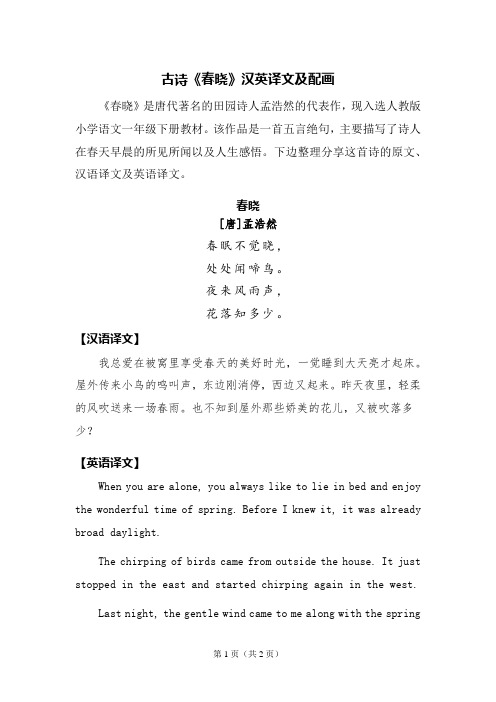
古诗《春晓》汉英译文及配画
《春晓》是唐代著名的田园诗人孟浩然的代表作,现入选人教版小学语文一年级下册教材。
该作品是一首五言绝句,主要描写了诗人在春天早晨的所见所闻以及人生感悟。
下边整理分享这首诗的原文、汉语译文及英语译文。
春晓
[唐]孟浩然
春眠不觉晓,
处处闻啼鸟。
夜来风雨声,
花落知多少。
【汉语译文】
我总爱在被窝里享受春天的美好时光,一觉睡到大天亮才起床。
屋外传来小鸟的鸣叫声,东边刚消停,西边又起来。
昨天夜里,轻柔的风吹送来一场春雨。
也不知到屋外那些娇美的花儿,又被吹落多少?
【英语译文】
When you are alone, you always like to lie in bed and enjoy the wonderful time of spring.Before I knew it, it was already broad daylight.
The chirping of birds came from outside the house. It just stopped in the east and started chirping again in the west.
Last night, the gentle wind came to me along with the spring
drizzle.
How many of those beautiful flowers on the big trees have been blown down?
【古诗配画】。
唐诗《春晓》的22种英译

唐诗《春晓》的22种英译【春眠不觉晓,处处闻啼鸟。
夜来风雨声,花落知多少。
】(唐孟浩然《春晓》)①I awake light-hearted this morning of spring. / Everywhere round me the singing of birds –/ But now I remember the night, the storm, / And I wonder how many blossoms were broken. (Witter Bynner & Kiang Kang-hu) ②Into my slumber in spring steal beams of morning, / and now to my ears come the voices of birds all around. / Yet I heard the sounds of winds and rains in the night, / I wonder how many flowers are fallen down to the ground. (万昌盛王僴中)③Oversleeping in spring I missed the dawn; / Now everywhere the cries of birds are heard. / Tumult of wind and rain had filled the night — / How many blossoms fell during the storm? (张廷琛& Bruce M. Wilson)④O’er spring drowse, lo! The morning dawns, / And everywhere b irds’ songs call. / It rained last night, and winds rustled so — / Plenty, me thinks, the blossoms’ fall. (林同济)⑤ Slumbering, I know not the spring dawn is peeping, / But everywhere the singing birds are cheeping. / Last night I heard the rain dripping and wind weeping, / how many petals are now on the ground sleeping? (吴钧陶)⑥Spring slumber slips by till daybreak, / Around me the birds are chirping awake. / Now I recall last night the wind and the rain, / And wonder how many petals have fallen. (刘军平)⑦Unconscious of dawning in the spring, / I hear birds crying all around. / There was sound of wind and rain all night; / How many flowers have fallen aground? (赵甄陶)⑧I wake to find the spring morn bright, / And hear birds singing all around. / Wind and rain was heavy last night, / How many flowers fell aground? (杨纪鹤)⑨This morn of spring in bed I’m lying, not to awake till birds are crying. After one night of wind and showers, how many are the fallen flowers! (许渊冲)⑩I slept in spring, unconscious of the dawn, / When songs of birds were heard on every lawn; / At night came sounds of rain and wind that blew, / How many a blossom fell no one knew!(许渊冲)⑪In springtide’s dreams the dawn is sweetly drowned; / Till everywhere the songs of birds resound. / I heard last night the rush of wind and rain. / How many flowers have fallen to the ground? (许渊冲)⑫Late! This spring morning as I awake I know. / All around me the birds are crying. The storm / last night, I sensed its fury, How many, / I wonder, are fallen, poor dear flowers!(翁显良)⑬I scarcely knew it was dawn, So sound was the sleep of spring; / Everywhere there was birdsong. / All night long was the sough of wind and rain; / How many flowers have fallen to the ground? (翁显良)⑭How suddenly the morning comes in spring! / On every side you hear the sweet birds sing: / Last night amidst the storm —Ah, who can tell, / With wind and rain, how many blossoms fell? (翁显良)⑮Sleeping in the spring, one hardly knows it’s daylight, / Birds are heard everywhere trilling. /There’ve been sounds of wind and rain in the night, / How many blossoms have been falling? (翁显良)⑯I slept in spring not conscious of the dawn, / But heard the gay birds chattering all round, / I remember, there was a storm at night. / Pray, how many blossoms have fallen down? (翁显良)⑰Sleeping in spring oblivious of dawn / everywhere I hear birds / after the wind and rain last night / I wonder how many petals fell (Red Pine) ⑱Asleep in the spring, dawn comes to me unawares; / I hear the birds singing all round. / When night comes there’s the sound of wind and rain; / Who knows how many blossoms fall to the ground. (Peter Harris)⑲I scarcely knew it was dawn, / So round was the sleep of spring; / Everywhere there was birdsong. / All night long was the sough of wind and rain; / How many flowers have fallen to the ground? (刘师舜1967)⑳How suddenly the morning comes in Spring! / On every side you hear the sweet birds sing. / Last night amidst the storm – Ah, who can tell, / With wind and rain, how many blossoms fell? (DAWN IN SPRING John Turner) 21.In drowsy spring I slept till daybreak / When the birds cry here and there, I awake. / Last night I heard a storm of wind and rain, / How many blossoms have fallen again? (《中国翻译》杂志2001年第2期)22. This spring morning in bed I’m lying / Not awake till I hear birds crying. / After one night of wind and showers / How many are the fallen flowers? (《中国翻译》杂志2001年第2期)注:这是本人正在编著的《汉英翻译大辞典》中的一个词条。
唐诗《春晓》的22种英译

唐诗《春晓》的22种英译【春眠不觉晓,处处闻啼鸟。
夜来风雨声,花落知多少。
】(唐孟浩然《春晓》)①I awake light-hearted this morning of spring. / Everywhere round me the singing of birds –/ But now I remember the night, the storm, / And I wonder how many blossoms were broken. (Witter Bynner & Kiang Kang-hu) ②Into my slumber in spring steal beams of morning, / and now to my ears come the voices of birds all around. / Yet I heard the sounds of winds and rains in the night, / I wonder how many flowers are fallen down to the ground. (万昌盛王僴中)③Oversleeping in spring I missed the dawn; / Now everywhere the cries of birds are heard. / Tumult of wind and rain had filled the night — / How many blossoms fell during the storm? (张廷琛& Bruce M. Wilson)④O’er spring drowse, lo! The morning dawns, / And everywhere b irds’ songs call. / It rained last night, and winds rustled so — / Plenty, me thinks, the blossoms’ fall. (林同济)⑤ Slumbering, I know not the spring dawn is peeping, / But everywhere the singing birds are cheeping. / Last night I heard the rain dripping and wind weeping, / how many petals are now on the ground sleeping? (吴钧陶)⑥Spring slumber slips by till daybreak, / Around me the birds are chirping awake. / Now I recall last night the wind and the rain, / And wonder how many petals have fallen. (刘军平)⑦Unconscious of dawning in the spring, / I hear birds crying all around. / There was sound of wind and rain all night; / How many flowers have fallen aground? (赵甄陶)⑧I wake to find the spring morn bright, / And hear birds singing all around. / Wind and rain was heavy last night, / How many flowers fell aground? (杨纪鹤)⑨This morn of spring in bed I’m lying, not to awake till birds are crying. After one night of wind and showers, how many are the fallen flowers! (许渊冲)⑩I slept in spring, unconscious of the dawn, / When songs of birds were heard on every lawn; / At night came sounds of rain and wind that blew, / How many a blossom fell no one knew!(许渊冲)⑪In springtide’s dreams the dawn is sweetly drowned; / Till everywhere the songs of birds resound. / I heard last night the rush of wind and rain. / How many flowers have fallen to the ground? (许渊冲)⑫Late! This spring morning as I awake I know. / All around me the birds are crying. The storm / last night, I sensed its fury, How many, / I wonder, are fallen, poor dear flowers!(翁显良)⑬I scarcely knew it was dawn, So sound was the sleep of spring; / Everywhere there was birdsong. / All night long was the sough of wind and rain; / How many flowers have fallen to the ground? (翁显良)⑭How suddenly the morning comes in spring! / On every side you hear the sweet birds sing: / Last night amidst the storm —Ah, who can tell, / With wind and rain, how many blossoms fell? (翁显良)⑮Sleeping in the spring, one hardly knows it’s daylight, / Birds are heard everywhere trilling. /There’ve been sounds of wind and rain in the night, / How many blossoms have been falling? (翁显良)⑯I slept in spring not conscious of the dawn, / But heard the gay birds chattering all round, / I remember, there was a storm at night. / Pray, how many blossoms have fallen down? (翁显良)⑰Sleeping in spring oblivious of dawn / everywhere I hear birds / after the wind and rain last night / I wonder how many petals fell (Red Pine) ⑱Asleep in the spring, dawn comes to me unawares; / I hear the birds singing all round. / When night comes there’s the sound of wind and rain; / Who knows how many blossoms fall to the ground. (Peter Harris)⑲I scarcely knew it was dawn, / So round was the sleep of spring; / Everywhere there was birdsong. / All night long was the sough of wind and rain; / How many flowers have fallen to the ground? (刘师舜1967)⑳How suddenly the morning comes in Spring! / On every side you hear the sweet birds sing. / Last night amidst the storm – Ah, who can tell, / With wind and rain, how many blossoms fell? (DAWN IN SPRING John Turner) 21.In drowsy spring I slept till daybreak / When the birds cry here and there, I awake. / Last night I heard a storm of wind and rain, / How many blossoms have fallen again? (《中国翻译》杂志2001年第2期)22. This spring morning in bed I’m lying / Not awake till I hear birds crying. / After one night of wind and showers / How many are the fallen flowers? (《中国翻译》杂志2001年第2期)注:这是本人正在编著的《汉英翻译大辞典》中的一个词条。
小学英语中国古诗赏析ASpringMorning(春晓)
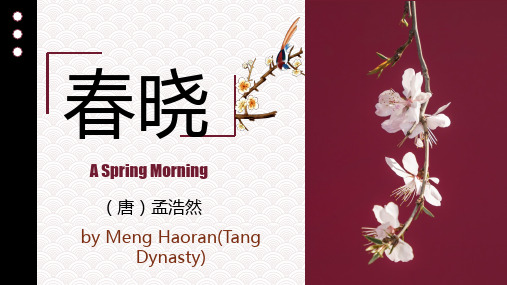
A Spring Morning
(唐)孟浩然 by Meng Haoran(Tang
Dynasty)
Contents
ONE
TWO THREE FOUR
BACKGROUND WORDS
PRACTICE DUBBING
壹 Background
古诗鉴赏
【春晓】
花夜处春 落来处眠 知风闻不 多雨啼觉 少声鸟晓 。,。,
醒来只听到到处有鸟儿啼叫。
awake
/əˈweɪk/
v.醒来
短语:half awake 半梦半醒
例句:The noise kept him awake. 噪音使他一直醒着。
拓展: 第三人称单数 awakes 现在分词 awaking 过去式 awoke或awaked
cry
/kraɪ/
v.哭泣
短语:cry out 大声呼喊
叁 Practice
Fill in blanks.
A Spring Morning This spring morning in bed I’m l ying , Not to awake till the birds are crying .
Fill in blanks.
A Spring Morning After one night of wind and shower , How many are the f allen flowers!
lie
短语:lie down躺下休息
/laɪ/
v.平躺,平卧
例句:He is lying on the bed 他正躺在床上。
(现在分词lying) 拓展:
lie还有撒谎的意思。
Don’t lie to me.不要对我撒谎。
从《春晓》的英译谈中国古诗的翻译
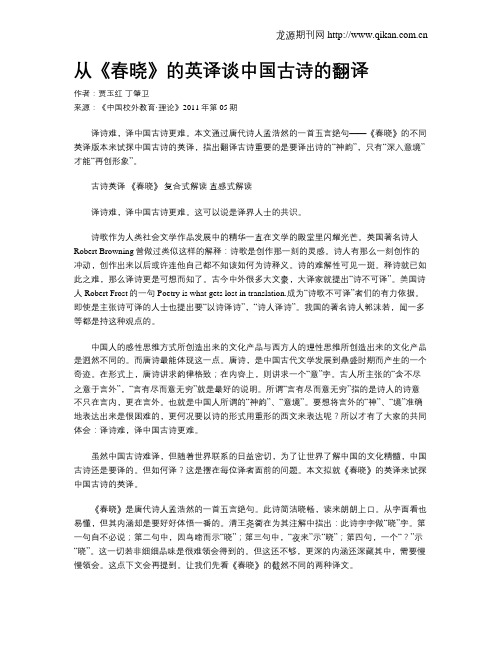
从《春晓》的英译谈中国古诗的翻译作者:贾玉红丁肇卫来源:《中国校外教育·理论》2011年第05期译诗难,译中国古诗更难。
本文通过唐代诗人孟浩然的一首五言绝句——《春晓》的不同英译版本来试探中国古诗的英译,指出翻译古诗重要的是要译出诗的“神韵”,只有“深入意境”才能“再创形象”。
古诗英译《春晓》复合式解读直感式解读译诗难,译中国古诗更难。
这可以说是译界人士的共识。
诗歌作为人类社会文学作品发展中的精华一直在文学的殿堂里闪耀光芒。
英国著名诗人Robert Browning曾做过类似这样的解释:诗歌是创作那一刻的灵感。
诗人有那么一刻创作的冲动,创作出来以后或许连他自己都不知该如何为诗释义。
诗的难解性可见一斑。
释诗就已如此之难,那么译诗更是可想而知了。
古今中外很多大文豪,大译家就提出“诗不可译”。
美国诗人Robert Frost的一句Poetry is what gets lost in translation.成为“诗歌不可译”者们的有力依据。
即使是主张诗可译的人士也提出要“以诗译诗”,“诗人译诗”。
我国的著名诗人郭沫若,闻一多等都是持这种观点的。
中国人的感性思维方式所创造出来的文化产品与西方人的理性思维所创造出来的文化产品是迥然不同的。
而唐诗最能体现这一点。
唐诗,是中国古代文学发展到鼎盛时期而产生的一个奇迹。
在形式上,唐诗讲求韵律格致;在内容上,则讲求一个“意”字。
古人所主张的“含不尽之意于言外”,“言有尽而意无穷”就是最好的说明。
所谓“言有尽而意无穷”指的是诗人的诗意不只在言内,更在言外。
也就是中国人所谓的“神韵”、“意境”。
要想将言外的“神”、“境”准确地表达出来是很困难的,更何况要以诗的形式用重形的西文来表达呢?所以才有了大家的共同体会:译诗难,译中国古诗更难。
虽然中国古诗难译,但随着世界联系的日益密切,为了让世界了解中国的文化精髓,中国古诗还是要译的。
但如何译?这是摆在每位译者面前的问题。
从《春晓》的英译谈中国古诗的翻译

《从《春晓》的英译谈中国古诗的翻译.doc》译诗难,译中国古诗更难。
本文通过唐代诗人孟浩然的一首五言绝句《春晓》的不同英译...将本文的Word文档下载,方便收藏和打印推荐度:点击下载文档https://m./wenxue/menghaoran/327719.html下载说明:1. 下载的文档为doc格式,下载后可用word文档或者wps打开进行编辑;2. 若打开文档排版布局出现错乱,请安装最新版本的word/wps 软件;3. 下载时请不要更换浏览器或者清理浏览器缓存,否则会导致无法下载成功;4. 网页上所展示的文章内容和下载后的文档内容是保持一致的,下载前请确认当前文章内容是您所想要下载的内容。
付费下载付费后无需验证码即可下载限时特价:6.00元/篇原价20元免费下载仅需3秒1、微信搜索关注公众号:copy839点击复制2、进入公众号免费获取验证码3、将验证码输入下方框内,确认即可复制联系客服微信支付中,请勿关闭窗口微信支付中,请勿关闭窗口×温馨提示支付成功,请下载文档我知道了咨询客服×常见问题•1、支付成功后,为何无法下载文档?付费后下载不了,请核对下微信账单信息,确保付费成功;已付费成功了还是下载不了,有可能是浏览器兼容性问题。
•2、付费后能否更换浏览器或者清理浏览器缓存后下载?更换浏览器或者清理浏览器缓存会导致下载不成功,请不要更换浏览器和清理浏览器缓存。
•3、如何联系客服?扫描下方二维码关注公众号“网站在线小助理”,及时联系客服解决。
请把【付款记录详情】截图给客服,同时把您购买的文章【网址】发给客服。
客服会在24小时内把文档发送给您。
(客服在线时间为周一至周五9:00-12:30 14:00-18:30)。
从系统功能语言学角度看《春晓》几个英译文的及物性特征
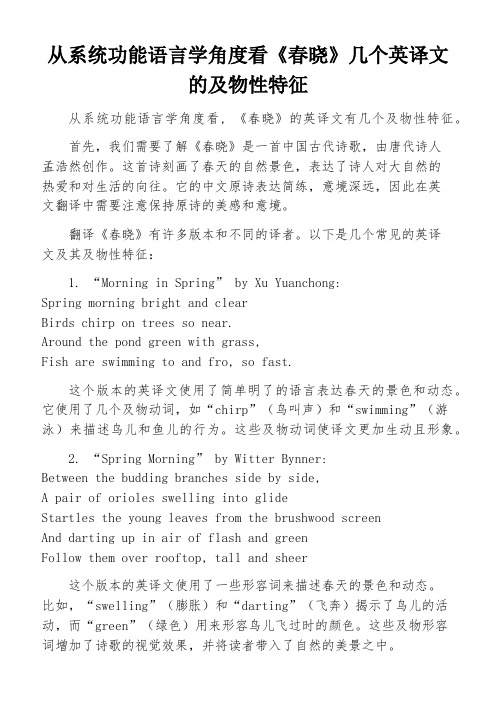
从系统功能语言学角度看《春晓》几个英译文的及物性特征从系统功能语言学角度看, 《春晓》的英译文有几个及物性特征。
首先,我们需要了解《春晓》是一首中国古代诗歌,由唐代诗人孟浩然创作。
这首诗刻画了春天的自然景色,表达了诗人对大自然的热爱和对生活的向往。
它的中文原诗表达简练,意境深远,因此在英文翻译中需要注意保持原诗的美感和意境。
翻译《春晓》有许多版本和不同的译者。
以下是几个常见的英译文及其及物性特征:1. “Morning in Spring” by Xu Yuanchong:Spring morning bright and clearBirds chirp on trees so near.Around the pond green with grass,Fish are swimming to and fro, so fast.这个版本的英译文使用了简单明了的语言表达春天的景色和动态。
它使用了几个及物动词,如“chirp”(鸟叫声)和“swimming”(游泳)来描述鸟儿和鱼儿的行为。
这些及物动词使译文更加生动且形象。
2. “Spring Morning” by Witter Bynner:Between the budding branches side by side,A pair of orioles swelling into glideStartles the young leaves from the brushwood screenAnd darting up in air of flash and greenFollow them over rooftop, tall and sheer这个版本的英译文使用了一些形容词来描述春天的景色和动态。
比如,“swelling”(膨胀)和“darting”(飞奔)揭示了鸟儿的活动,而“green”(绿色)用来形容鸟儿飞过时的颜色。
这些及物形容词增加了诗歌的视觉效果,并将读者带入了自然的美景之中。
春晓的古诗英语赏析

春晓的古诗英语赏析Spring Morning Ancient Poem English Appreciation。
Spring Morning is a famous ancient Chinese poem written by Tang Dynasty poet Meng Haoran. It describes the beauty of nature in the early morning of spring, and the sense of peace and tranquility that comes with it. The poem has been widely admired for its simple yet profound depiction of the natural world, and has been translated into many languages, including English.The poem goes like this:春眠不觉晓,。
处处闻啼鸟。
夜来风雨声,。
花落知多少。
In English, it can be translated as:In spring, sleep is not yet awake,。
Everywhere I hear birds singing.During the night, the sound of wind and rain,。
How many flowers have fallen, who knows?The poem captures the essence of spring, with its fresh and vibrant imagery. It is a celebration of the awakening of nature after the long, cold winter, and the joy and beauty that comes with it.The first two lines of the poem describe the speaker's reluctance to wake up from his deep slumber in the early morning of spring. The use of the word "春眠" (spring sleep)creates a sense of laziness and contentment, as if the speaker is reluctant to leave the comfort of his bed. This feeling is further emphasized by the phrase "不觉晓" (not yet awake), which suggests that the speaker is still half-asleep, lost in the dreamy world of spring.The next two lines of the poem introduce the sounds of nature that awaken the speaker from his slumber. The phrase "处处闻啼鸟" (everywhere I hear birds singing) creates a sense of the surrounding nature coming to life, as the birds chirp and sing in the early morning. This line evokes a sense of joy and excitement, as the speaker is greeted by the cheerful melodies of the birds.The last two lines of the poem introduce a contrast to the joyful scene of spring awakening. The phrase "夜来风雨声" (during the night, the sound of wind and rain) suggests that the speaker has been disturbed by the sounds of the night, which may have been harsh and unsettling. This line introduces a sense of contrast to the peaceful and joyful scene of spring awakening, as it reminds the reader that nature is not always gentle and serene.The final line of the poem, "花落知多少" (how many flowers have fallen, who knows?), introduces a sense of melancholy and reflection. It suggests that the beauty of spring is fleeting and transient, as the flowers that bloom will eventually wither and fall. This line serves as a reminder of the impermanence of life and the beauty of nature, and adds a layer of depth and complexity to the poem.The poem Spring Morning is a timeless classic that continues to resonate with readers today. Its simple yet profound depiction of the beauty of spring and the transient nature of life has made it a beloved and enduring piece of literature. The poem's themes of nature, beauty, and impermanence are universal and timeless, and continue to inspire and move readers across cultures and generations.In conclusion, Spring Morning is a masterpiece of ancient Chinese poetry that captures the beauty and essence of spring. Its simple yet profound imagery and themes ofnature, beauty, and impermanence continue to resonate with readers today, making it a timeless classic that will continue to be admired and appreciated for generations to come.。
从及物性理论看古诗《春晓》的翻译
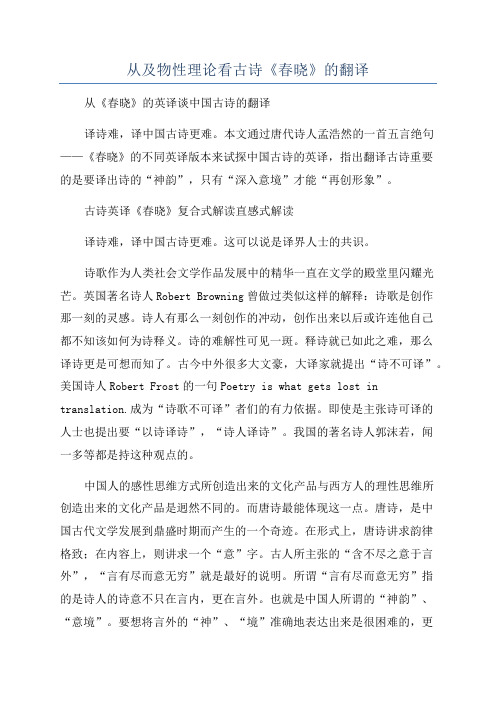
从及物性理论看古诗《春晓》的翻译从《春晓》的英译谈中国古诗的翻译译诗难,译中国古诗更难。
本文通过唐代诗人孟浩然的一首五言绝句——《春晓》的不同英译版本来试探中国古诗的英译,指出翻译古诗重要的是要译出诗的“神韵”,只有“深入意境”才能“再创形象”。
古诗英译《春晓》复合式解读直感式解读译诗难,译中国古诗更难。
这可以说是译界人士的共识。
诗歌作为人类社会文学作品发展中的精华一直在文学的殿堂里闪耀光芒。
英国著名诗人Robert Browning曾做过类似这样的解释:诗歌是创作那一刻的灵感。
诗人有那么一刻创作的冲动,创作出来以后或许连他自己都不知该如何为诗释义。
诗的难解性可见一斑。
释诗就已如此之难,那么译诗更是可想而知了。
古今中外很多大文豪,大译家就提出“诗不可译”。
美国诗人Robert Frost的一句Poetry is what gets lost in translation.成为“诗歌不可译”者们的有力依据。
即使是主张诗可译的人士也提出要“以诗译诗”,“诗人译诗”。
我国的著名诗人郭沫若,闻一多等都是持这种观点的。
中国人的感性思维方式所创造出来的文化产品与西方人的理性思维所创造出来的文化产品是迥然不同的。
而唐诗最能体现这一点。
唐诗,是中国古代文学发展到鼎盛时期而产生的一个奇迹。
在形式上,唐诗讲求韵律格致;在内容上,则讲求一个“意”字。
古人所主张的“含不尽之意于言外”,“言有尽而意无穷”就是最好的说明。
所谓“言有尽而意无穷”指的是诗人的诗意不只在言内,更在言外。
也就是中国人所谓的“神韵”、“意境”。
要想将言外的“神”、“境”准确地表达出来是很困难的,更何况要以诗的形式用重形的西文来表达呢?所以才有了大家的共同体会:译诗难,译中国古诗更难。
中国古典诗词翻译中的意境再现——评孟浩然《春晓》四种英译_百度文库...

(1)汹矾圈删
№tⅧb印dll
佻皿,n】崦of咖iIlbedI锄蚺19,
胁咄血咖of、枷and sho螂,
№w删啊舭妇舢en flo溯s!
(2)(wc唱Ⅺ锄li∞曲
Ille蕾硫也c啪】孚
恬淡氛围相符。1i嗽的译文为感叹句,突出作者对一觉
动,末两句笔锋一转,道出了作者的内心深处的沉呤,这由 表及里的转换,仿佛电影镜头从远处切换一下子拉到近前, 让读者体验到作者的内心。原诗呈汉语特有的多分句线性 轴排结构,每个方向紧扣诗人活动的—个瞬间,体现了汉语
重“意义”、“神摄”的特点,但语义环环相扣,呈递进状态。
第一、二句为动宾(短语)结构,第三句为名词短语,最后一个 为感叹句。作为汉诗英译,译文的形式与源文形式不可能 对应。“译者选择的形式可以多种多样,必须能最大程度地 传递原文的语义和意境”(黄国文1999:106一115),也就是说 形式的选择会不可避免地影响语义和意境的传达。 对于第一句,许渊冲和吴钧陶都将源句的短语处理为 小句(陈述句),这样的处理显得波澜不兴,平稳自然,与原诗
转化不但使叙述的重心由暗含的“我”转为明指的“你”,也 与两句译文中的插入语“Ah,谢D 人的内心活动。
can
胁眦哪妇恤sil咖bir凼躺chc砸咯
脚唧pctaIs眦∞wonthe孕ol刚sIe印岫眇
Last血班Ille钌dtl砖期in∞啦and诚ndw∞pil唱,
从译文形式上与原文变化不似翁译那样明显。第三句
砸他r译文形式上测变为更为自然;吴氏译文中第三
句处理为主谓结构的陈述句。也十分自然贴切。
第4句许译为感叹句,句式和语气与原作十分贴切,翁
译为宾语从句,吴译与1'呲盯的译文都是疑问句。
古诗词英译对比之四 春晓优选PPT
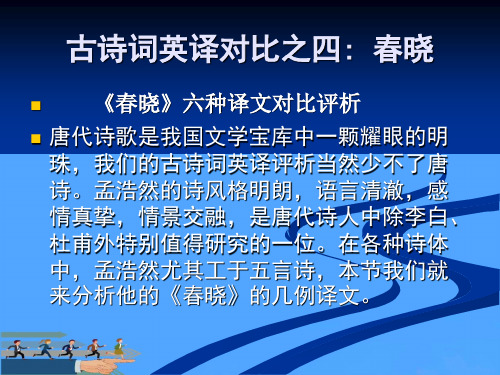
只向读者透露出他的心迹,让读者自己去 徐译一个突出的特点是用韵巧妙,/in/音轻灵剔透,/oun/音婉转低吟,很好地再现了原诗的神韵和风格。
This morn of spring in bed I’m lying,
捉摸、去猜想。诗人写景,仅选取了春天 Spring Mornings
扬格,全诗基本不押韵,所以这首译诗在 音美上也稍差人意。
译文五:
One Morning in Spring
Tr. 翁显良
Late! This spring morning as I awake I know.
All around me the birds are crying, crying.
How many flowers have dropped? Can that be known?
首先题目的翻译有问题,该诗描写的是一个春天 的早晨,而不是几个或好几个春天的清晨。正确 的译法应该是a spring morning。 一、二行的 One slumbers late in the morning in spring, Everywhere, one hears ┅ 似乎写景的客观性太 强了些,让人难以体会诗人融于景中的情和意。 但birds warble or sing用得好,表现了前两行 诗中春意盎然的景象和诗人爱春的心情。前三行 合起来似纯写景,与末行的感慨略有脱节。末行 虽连用两个问句,语意曲折婉转,但较难引起读 者的共鸣,使其无法分享诗人触景生情,有感而 发的感慨。
且第一句就直抒胸臆,多少违背了中国古诗的审美特性。
Spring Mornings
的一个侧面,从听觉角度着笔描写春之声: The storm last night, I sensed its fury.
《春晓》原文翻译及赏析
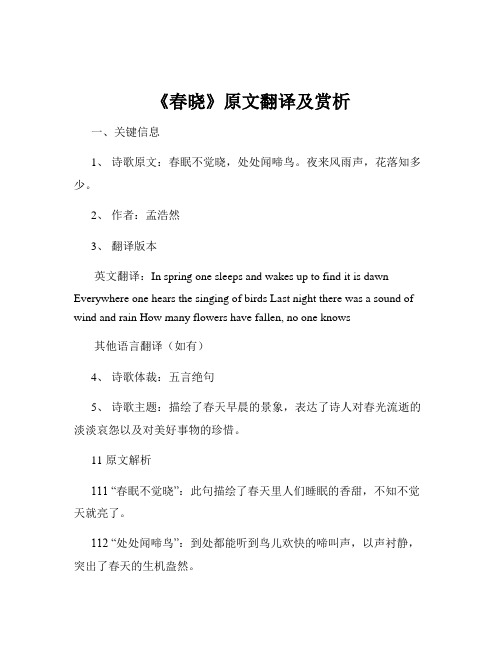
《春晓》原文翻译及赏析一、关键信息1、诗歌原文:春眠不觉晓,处处闻啼鸟。
夜来风雨声,花落知多少。
2、作者:孟浩然3、翻译版本英文翻译:In spring one sleeps and wakes up to find it is dawn Everywhere one hears the singing of birds Last night there was a sound of wind and rain How many flowers have fallen, no one knows其他语言翻译(如有)4、诗歌体裁:五言绝句5、诗歌主题:描绘了春天早晨的景象,表达了诗人对春光流逝的淡淡哀怨以及对美好事物的珍惜。
11 原文解析111 “春眠不觉晓”:此句描绘了春天里人们睡眠的香甜,不知不觉天就亮了。
112 “处处闻啼鸟”:到处都能听到鸟儿欢快的啼叫声,以声衬静,突出了春天的生机盎然。
113 “夜来风雨声”:诗人回忆起昨夜的风声雨声,增添了一丝淡淡的忧愁。
114 “花落知多少”:想到风雨可能吹落了不少花朵,流露出对春花凋零的惋惜之情。
12 翻译技巧与难点121 如何准确传达“觉”“晓”“啼鸟”等词汇的含义。
122 在英文翻译中,如何保持原诗的韵律和意境。
13 诗歌的艺术特色131 语言简洁明快,意境清新自然。
132 动静结合,以“眠”“不觉晓”的静态描写与“啼鸟”“风雨声”的动态描写相结合,生动展现春天的景象。
133 寓情于景,通过对春天景色的描绘,含蓄地表达了诗人的情感。
14 诗歌的影响141 对后世诗歌创作的启发,成为众多诗人模仿和借鉴的对象。
142 在文化传承中的重要地位,是中国古典诗歌的经典之作。
15 不同读者的理解与感悟151 儿童可能感受到春天的美好和生机。
152 成年人可能会从中体会到时光的匆匆和生命的无常。
16 与其他同类诗歌的比较161 与王维的《鸟鸣涧》在表现手法和情感表达上的异同。
《春晓》英译本评析

《春晓》英译本评析摘要:“信达雅”这一翻译标准在翻译界是最有影响的。
本文以这一标准为宏观参数,以情感、形象、风格作为微观参数对《春晓》的三个英译本进行了评析。
关键词:《春晓》情感形象风格1. 引言在中国翻译界中,严复所提的“信达雅”翻译标准是最有影响的。
“信”、“达”、“雅”三个字早在三国时支谦的《法句经序》中即已全都出现,但将这三个字作为“译事楷模”(即标准)而提出,则始自严复。
他在《天演论》卷首的《译例言》的第一段中指出:“译事三难:信、达、雅。
求其信,已大难矣。
顾信矣不达,虽译犹不译也,则达尚焉。
”又说:“《易》曰:‘修辞立诚。
’子曰:‘辞达而已。
’又曰:‘言之无文,行之不远。
’三者乃文章正轨,亦即为译者楷模。
故信达而外,求其尔雅。
此不仅期以行远已耳,实则精理微言,用汉以前字法句法,则为达易;用近世利俗文字,则求达雅。
”[1]他所谓的“信”是指把原文的本意完全正确地介绍,忠实地传达原作内容;“达”是指语句的通达顺畅,使译本读者能够读懂、理解;“雅”是指在译作中体现原文的写作风格。
就“信达雅”三者的关系而言,“信”是主要的标准,舍弃“信”就不谓翻译。
当然,不同写作风格,不同语体的原作,有不同的侧重点。
对于文学翻译而言,就不仅仅在于“信”和“达”,更应该强调的是“雅”的标准。
本文运用“信达雅”这一翻译标准作为宏观参数,情感、形象、风格作为微观参数来对《春晓》的三个译本进行对比评析。
2.译本评析孟浩然是一个以白衣终其一生的诗人。
他的一生除了在唐玄宗开元十六年曾去长安应试外,其余时间都是在隐居田园和游历山水中度过的。
他认为生活在繁盛的时代,作为一个知识分子不能为社会做事而平居一生是可耻的,所以他以四十岁为界,前半生主要是在家闭门苦学,为应试和做官作准备。
开元十六年去长安应试失败后,也曾产生过失望和怨恨情绪。
但从长安回到故乡后,心境渐渐平静下来,最后安心在故乡隐居。
《春晓》为五言绝句,韵脚优美,对仗整齐,节奏明快,是他的咏春佳作,语言平白如话,清新自然,而诗意隐约,情韵悠长。
中国古诗名英文翻译对照
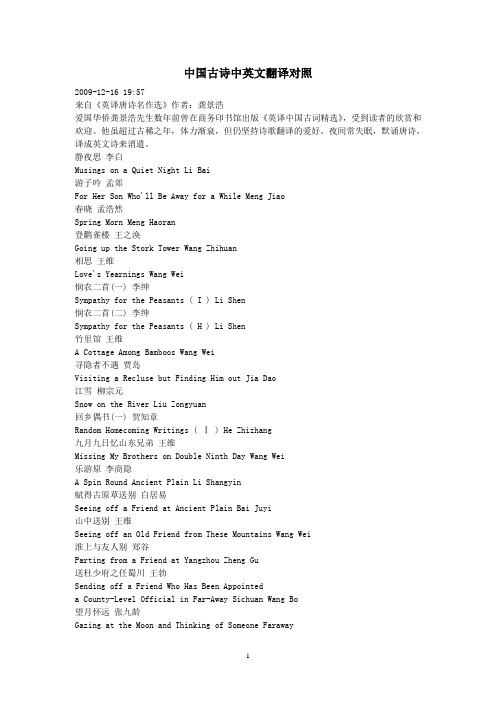
中国古诗中英文翻译对照2009-12-16 19:57来自《英译唐诗名作选》作者:龚景浩爱国华侨龚景浩先生数年前曾在商务印书馆出版《英译中国古词精选》,受到读者的欣赏和欢迎。
他虽超过古稀之年,体力渐衰,但仍坚持诗歌翻译的爱好。
夜间常失眠,默诵唐诗,译成英文诗来消遣。
静夜思李白Musings on a Quiet Night Li Bai游子吟孟郊For Her Son Who'll Be Away for a While Meng Jiao春晓孟浩然Spring Morn Meng Haoran登鹳雀楼王之涣Going up the Stork Tower Wang Zhihuan相思王维Love's Yearnings Wang Wei悯农二首(一) 李绅Sympathy for the Peasants ( I ) Li Shen悯农二首(二) 李绅Sympathy for the Peasants ( H ) Li Shen竹里馆王维A Cottage Among Bamboos Wang Wei寻隐者不遇贾岛Visiting a Recluse but Finding Him out Jia Dao江雪柳宗元Snow on the River Liu Zongyuan回乡偶书(一) 贺知章Random Homecoming Writings ( Ⅰ ) He Zhizhang九月九日忆山东兄弟王维Missing My Brothers on Double Ninth Day Wang Wei乐游原李商隐A Spin Round Ancient Plain Li Shangyin赋得古原草送别白居易Seeing off a Friend at Ancient Plain Bai Juyi山中送别王维Seeing off an Old Friend from These Mountains Wang Wei淮上与友人别郑谷Parting from a Friend at Yangzhou Zheng Gu送杜少府之任蜀川王勃Sending off a Friend Who Has Been Appointeda County-Level Official in Far-Away Sichuan Wang Bo望月怀远张九龄Gazing at the Moon and Thinking of Someone FarawayZhang J iuling白石滩王维White Stone Beach Wang Wei鸟鸣涧王维Birds Chirping over the Hill Creek Wang Wei春夜喜雨杜甫Propitious Rain Falling at Midnight Du Fu宿建德江孟浩然Staying Overnight on Jiande River Meng Haoran滁州西涧韦应物Chuzhou's West Brook Wei Yingwu题破山寺后禅院常建Meditation Rooms at the Back of the Cleft-BoulderHill Temple Chang Jian绝句杜甫A Heptasyllabic Quatrain Du Fu阙题刘脊虚A Poem Lacking a Title Liu Shenxu送元二使安西王维Sending off a Friend, Who Has Been Appointed Envoy to the West Lands Wang Wei凉州词王之涣Liangzhou Song Wang Zhihuan凉州词王翰Liangzhou Song Wang Hah夜宿山寺李白Staying Overnight in a Mountain Temple Li Bai杂诗(其二) 王维Miscellaneous Poems (Second in a Series) Wang Wei问刘十九自居易Asking a Friend Bai Juyi风李峤Wind Li Qiao马诗李贺A Horse Poem Li He秋浦歌李白Autumn Waterside Songs Li Bai剑客贾岛Jianke Jia Dao于易水送人骆宾王Sending off a Warrior By the Yishui River LuG Binwang 春怨金昌绪Complaint Against Spring lin Changxu竹枝词刘禹锡The Bamboo Song Liu Yuxi城东早春杨巨源Early Spring in East City Yang Juyuan晚春韩愈Late Spring Han Yu山亭夏日高骈A Summer's Day in a Hill Garden Gao Pian秋日耿讳An Autumn Day Geng Wei白雪歌送武判官归京岑参Snow (For Chief of Secretarial Staff Wu,Who Was B&ng Called Back to the Capital) Cen Shen过故人庄孟浩然Visiting an Old Friend's Country Place Meng Haoran江村即事司空曙Scene from a Riverside Village Sikong Shu社日王驾Community Day Wang Jia送人游吴杜荀鹤Seeing off a Friend, Who Was Going to Tour Suzhou Du Xunhe 枫桥夜泊张继Night Boat Call at Maple Bridge, Suzhou Zhang Ji早发白帝城李白Sailing Early from Baidi Town Li Bai黄鹤楼送孟浩然之广陵李白Seeing off Fellow Poet Meng Haoran, Who WasLeaving the Yellow Crane Tower for Yangzhou Li Bai黄鹤楼崔颢The Yellow Crane Tower Cui Hao夜雨寄北李商隐A Letter Sent North about These Nightly Rainsin Bashan Mountains Li Shangyin无题李商隐Poem Without a Title Li Shangyin登幽州台歌陈子昂Ascending Youzhou Terrace Chen Zi'ang与诸子登岘首孟浩然Climbing Mount Xianshou with Scholarly Friends Meng Haoran 滕王阁王勃Prince of Teng's Pavilion-House Wang Bo洛阳道储光羲The Luoyang Highway Chu Guangxi遣悲怀元稹Venting My Sorrow Yuan Zhen赠卖松人于武陵To a Tree Vendor Yu Wuling乌衣巷刘禹锡Black Robe Lane Liu Yuxi清明杜牧The Day of Clear and Bright Du Mu江南春杜牧Spring Comes to Jiangnan Du Mu泊秦淮杜牧Overnight Stay on Qinhuai River, Nanjing Du Mu山行杜牧Driving by the Mountain Du Mu金缕衣杜秋娘Garment Stitched with Gold Threads Du Qiuniang自遣罗隐Self Consolation Luo Yin题都城南庄崔护South Side of the Capital City Cui Hu月下独酌李白Drinking Alone Underneath a Moon Li Bai将进酒李白Drink Your Fill! Li Bai春日忆李白杜甫Remembering Li Bai on a Spring Day Du Fu春望杜甫Spring Outlook Du Fu前出塞杜甫Song of the Fortified Town (One from a First Group of"Fortified Town" Poems) Du Fu石壕吏杜甫A Village Official Du Fu陪诸贵公子丈八沟携妓纳凉晚际遇雨杜甫A Cruise on Long-Ditch Creek in the Company of Some Young Gentlemen and Their "Hired" Ladies, and Got Caught in a Shower Along the Twilight Hour Du Fu与朱山人杜甫To Zhu—the Mountain Person Du Fu赠卫八处士杜甫To a Younger Friend, Who Is a Retiring Sort of Person Du Fu李白篇送友人青山横北郭白水绕东城此地一为别孤蓬万里征浮云游子意落日故人情挥手自兹去萧萧班马鸣Farewell To A FriendGreen mountains bar the northern sky;White water girds the eastern town.Here is the place to say good-bye;You'll drift like lonely thisledown.With floating cloud you'll float away;Like parting day I'll part from you.We wave as you start on your way;Our steeds still neigh, "Adieu, adieu!"登金陵凤凰台凤凰台上凤凰游凤去台空江自流吴宫花草埋幽径晋代衣冠成古丘三山半落青天外二水中分白鹭洲总为浮云能蔽日长安不见使人愁On Phoenix Terrace At JinlingOn Phoenix Terrace once phoenixes came to sing;The birds are gone, but still roll on the river's waves. The ruined palace's buried 'neath the weeds in spring; The ancient sages in caps and gowns all lie in graves. The three-peak'd mountain is half lost in azure sky; The two-fork'd stream by Egret Isle is kept apart.As floating clouds can veil the bright sun from the eye, Imperial Court, now out of sight, saddens my heart.宣州谢眺楼饯别校书叔云弃我去者昨日之日不可留乱我心者今日之日多烦忧长风万里送秋雁对此可以酣高楼蓬莱文章建安骨中间小谢又清发俱怀逸兴壮思飞欲上青天览明月抽刀断水水更流举杯销愁愁更愁人生在世不称意明朝散发弄扁舟Farewell To Uncle Yun, The Imperial Librarian, At The Xie Tiao Pavilion In XuanzhouWhat left me yesterdayCan be retained no more;What worries me todayAre the times for which I feel sore.In autumn wind for miles and miles the wild geese fly.Let's follow them with eyes and drink in tower high.Your writing's forcible, like ancient poets, whileMine is in Junior Xie's direct and easy style.Both of us have ambitions high;We'd bring the moon down from the sky.Cut running water with a sword, it will faster flow;Drink wine to drown your sorrow, it will heavier grow.If we despair in our lifetime of all affairs,Tomorrow let us sail away with loosened hairs.赠汪伦李白乘舟将欲行忽闻岸上踏歌声桃花潭水深千尺不及汪伦送我情To Wang LunI, Li Bai, sit aboard a ship about to goWhen suddenly on shore your farewell songs o'erflow. However deep the Lake of Peach Blossom may be,It's not so deep, O Wang Lun! as your love for me.早发白帝城朝辞白帝彩云间千里江陵一日还两岸猿声啼不住轻舟已过万重山Leaving White Emperor Town At DawnLeaving at dawn the White Emperor crowned with cloud, I've sailed a thousand li through canyons in a day. With monkeys' sad adieus the riverbanks are loud;My skiff has left ten thousand mountains far away.月下独酌花间一壶酒独酌无相亲举杯邀明月对影成三人月既不解饮影徒随我身暂伴月将影行乐须及春我歌月徘徊我舞影零乱醒时同交欢醉后各分散永结无情游相期邈云汉Drinking Alone Under The MoonAmong the flowers from a pot of wineI drink alone beneath the bright moonshine.I raise my cup to invite the moon, who blendsHer light with my shadow and we're three friends. The moon does not know how to drink her share;In vain my shadow follows me here and there. Together with them for the time I stayAnd make merry before spring's spend away.I sing the moon to linger with my song;My shadow disperses as I dance along.Sober, we three remain cheerful and gay; Drunken, we part and each goes his way.Our friendship will outshine all earthly love; Next time we'll meet beyond the stars above.杜甫篇望岳岱宗夫如何齐鲁青未了造化钟神秀阴阳割昏晓荡胸生层云决眦入归鸟会当凌绝顶一览众山小Gazing At Mount TaiO, peak of peaks, how high it stands!One boundless green o'erspreads two states.A marvel done by nature's hands,O'er light ang shade it dominates.Clouds rise therefrom and lave my breast;I strain my eyes and see birds fleet.I must ascend the mountain's crest;It dwarfs all peaks under my feet.赠李白秋来相顾尚飘蓬未就丹砂愧葛洪痛饮狂歌空度日飞扬跋扈为谁雄To Li BaiWhen autumn comes, you're drifting still like thistledown. You try to find the way to heaven, but you fail.In singing mad and drinking dead your days you drown.For whom will fly the roc? For whom will leap the whale?兵车行车辚辚马萧萧行人弓箭各在腰耶娘妻子走相送尘埃不见咸阳桥牵衣顿足拦道哭哭声直上干云霄道旁过者问行人行人但云点行频或从十五北防河便至四十西营田去时里正与裹头归来头白还戍边边廷流血成海水武皇开边意未已君不闻汉家山东二百州千村万落生荆杞纵有健妇把锄犁禾生陇亩无东西况复秦兵耐苦战被驱不异犬与鸡长者虽有问役夫敢伸恨且如今年冬未休关西卒县官急索租租税从何出信知生男恶反是生女好生女犹得嫁比邻生男埋没随百草君不见青海头古来白骨无人收新鬼烦冤旧鬼哭天阴雨湿声啾啾Song Of The ConscriptsChariots rumbleand horses grumble.The conscripts march with bow and arrows at the waist.Their fathers, mothers, wives and children come in hasteTo see them off; the bridge is shrouded in dust they've raised.They clutch at the men's coats and stamp and bar the way;Their grief cries loud and strikes the cloud straight, straightaway. Another onlooker by roadside asks an enrollee,"The conscription is frequent," only answers he."Some went north at fifteen to guard the rivershoreAnd were sent west to till the land at forty-four.The elder bound their young heads when they went away;Just home, they're sent to the frontier though their hair's grey. The field on borderland becomes a sea of blood;The emperor's greed for land is still at high blood.Have you not heard two hundred districts east of the Hua Mountain lie Where briers and brambles grow in villages far and night?Although stout women can wield the plough and the hoe,They know not east from west where thorns and weeds o'ergrow.The enemy are used to hard and stubborn fight:Our men are driven just like dogs or fowls in flight.You are kind to ask me.To complain I'm not free.In winter of this yearConscription goes on here.The magistrates for taxes press;How can we pay them in distress!If we had known sons bring no joy,We'd have preferred girl to boy.A daughter can be married to a neighbour, alas!A son can only be buried under the grass!Have you not seenOn borders greenBleached bones since olden days unburied on the plain?The old ghosts weep and cry, while the new ghosts complain;The air is loud with screech and scream in gloomy rain."将进酒 ----李白君不见,黄河之水天上来,奔流到海不复回?君不见,高堂明镜悲白发,朝如青丝暮成雪?人生得意须尽欢,莫使金樽空对月,天生我材必有用,千金散尽还复来。
从“春晓”英译谈诗歌译文赏析

从“春晓”英译谈诗歌译文赏析摘要诗歌是一种重要的文学体裁,古诗英译也是传递文化、研究语言的必由之路。
许渊冲的“美化之艺术”观点是对诗歌翻译和赏析方法的核心概括,其意美、音美、形美的“三美原则”的统一是古诗英译和译文赏析时遵循的最基本原则。
本文据此评析《春晓》一诗较为经典的两篇译文,通过进行对比分析来探讨各自特点,并进一步提出,在诗歌译文赏析时,读者既要关注诗歌之美,又要注意译者对于原作的侧重点和体现的文学、美学价值。
关键词:《春晓》三美原则古诗英译译文赏析中图分类号:h059 文献标识码:a诗歌是文学作品中最纯粹和唯美的一种文学体裁,也是各种文学样式里出现最早、最基本、影响最深远的一种文学形式。
它是内容美和形式美的统一,即借助于独特的节奏和凝练的语言,表达诗人的思想和情趣,反映社会生活,并且创造出“言有尽而意无穷”的审美享受。
《汉语词典》对其解释为“诗歌是文学体裁的一种,通过有节奏和韵律的语言反映生活,抒发情感”。
《新牛津英汉双解大词典》的解释为“诗歌是运用节奏、韵律和想象,表达情感、描述事件的文字形式”。
由此可见,诗歌在英汉两种语言里都是一种既注重语言内容又注重艺术形式的文学手段,而且充分体现了语言承载的文化内涵和作者深刻的情感诉求。
一许渊冲的“美化之艺术”理论为了传承世界文明,交流文化,更广泛和深层次地研究语言,英汉诗歌互译始终是翻译领域的一个热点,是可译还是不可译、是重意义表达还是重形式表现之类的讨论,多年来未曾休止;对诗歌译文的赏析也常常让读者费解,是从本族语的特点还是从目标语的特点着眼;对诗歌之美如何在译文中得到体现也是众说纷纭。
特别是汉语古诗英译,在中外文学评论界、翻译界有着悠久的历史。
许多中外学者、翻译学家为此做出了不懈的努力,提出了各具特色的英译古诗的原则和赏析方式。
王秉钦在他的《20世纪中国翻译思想史》一书中总结了中国传统翻译思想发展史的十大学说:古代的“文质说”,近代严复的“信达雅说”,现代鲁迅的“信顺说”,郭沫若的“翻译创作论”,林语堂的“翻译美学论”,朱光潜的“翻译艺术论”,茅盾的“艺术创造性翻译论”,傅雷的“神似说”,钱钟书的“化境说”,焦菊隐的“整体论”,等等,这些理论无一不影响着古诗英译方式和赏析角度。
孟浩然春晓英译赏析「双语」

孟浩然春晓英译赏析「双语」孟浩然春晓英译赏析「双语」《春晓》是唐代诗人孟浩然隐居在鹿门山时所作,诗人抓住春天的早晨刚刚醒来时的一瞬间展开联想,描绘了一幅春天早晨绚丽的图景。
下面由店铺给大家分享《春晓》的赏析,欢迎阅读!春晓孟浩然春眠不觉晓,处处闻啼鸟。
夜来风雨声,花落知多少。
词句注释⑴不觉晓:不知不觉天就亮了。
晓:早晨,天明,天刚亮的时候。
⑵闻:听见。
啼鸟:鸟啼,鸟的啼叫声。
⑶“夜来”句:一作“欲知昨夜风”。
⑷“花落”句:一作“花落无多少”。
知多少:不知有多少。
知:不知,表示推想。
[1] [2-3]白话译文春天睡醒不觉天已大亮,到处是鸟儿清脆的叫声。
回想昨夜的阵阵风雨声,吹落了多少芳香的春花。
英语翻译:翁显良译文:Late! This morning as I awake I know.All around me the birds are crying, crying.The storm last night, I sensed its fury.How many, I wonder, are fallen, poor dear flowers.许渊冲译文:This morn of spring in bed I’m lying,Not wake up till I hear birds crying.After on night of wind and showers,How many are the fallen flowers!约翰·特纳译文:How suddenly the morning comes in Spring!On every side you can hear the sweet birds sing.Last night amidst the storm — Ah, who can tell,With wind and rain, how many blossoms fell?赏析:1、意美《春晓》这首小诗,整首诗行云流水,平易自然,却又悠远深厚。
三种译本的《春晓》

三种译本的《春晓》摘要:通过对比《春晓》三种有代表性的英译文,分析了由于中国古典诗歌自身的特点以及语言和文化差异造成的古诗翻译中相应的难点,对比剖析了中外名家译例的特点并着重探讨其在炼词方面的得失。
关键词:中国古诗;翻译;对比;炼词1 引言唐朝是中国历史上政治开明、经济繁荣、文化昌盛的时期,在这个时期中国古体诗(格律诗)的创作达到了鼎盛。
唐诗语言优美、文字流畅、意境高雅、情感真挚、思想开放而深邃,是中华民族文学宝库的精华,也是绽放在世界文苑里的一枝奇葩。
诺贝尔文学评奖委员会主席埃斯库马克盛赞中国文学独特的艺术美时曾说:“世界上哪些作品能与中国的唐诗和《红楼梦》相比呢?”《春晓》是中国千百年来脍炙人口的一首唐诗。
此诗语言精炼自然,音韵和谐婉转,读来意味无穷。
中外许多著名诗人,学者和翻译家都曾将其译成英文和其他文字。
本文选取了其中三种有代表性的英译文,并对每篇译文的特点及其炼词略作剖析,以期对古诗英译有进一步的了解。
2 原诗与译诗的比较与分析春晓孟浩然春眠不觉晓,处处闻啼鸟。
夜来风雨声,花落知多少?译文一:Witter Bynner译,A Spring MorningI awake light-hearted this morning of spring,Everywhere round me the singing of birds——But now I remember the night, the storm,And I wonder how many blossoms were broken?(The Jade Mountain, Witter Bynner and Kiang Kang-hu, New York, Knopf, 1929) 简评:Bynner是英译中国古诗的名家。
对于他的译文,评论家的意见各不相同。
吕叔湘在这首诗的《赘言》中写道:“通首言之,仍是译中佳品”。
从炼词的角度看,Bynner在译文的前两句中使用了“light-hearted”和“singing of birds”,勾画出百鸟欢唱令人心怡神爽的美春景象,体现了原诗前两句的悦春之情。
诗歌《春晓》五个译本之对比赏析

文学评论·古典文学诗歌《春晓》五个译本之对比赏析贾文娇 西北大学外国语学院摘 要:不同的语言环境,不同的翻译方法,不同的译者会对同一个译本有着多种翻译版本。
本文选取唐朝诗人孟浩然写的诗《春晓》作为研究文本并对其5种译本进行对比分析,体会中外译者在面对同一文本时译者主体性的发挥,从而赏析译文之美。
关键词:译者;主体性;《春晓》作者简介:贾文娇(1992-),西北大学硕士研究生,研究方向:外国语言学及其应用语言学。
[中图分类号]:H315.9 [文献标识码]:A[文章编号]:1002-2139(2017)-09-072-02一、引言《春晓》是我国唐代山水派诗人孟浩然所写的一首五言绝句诗。
春晓春眠不觉晓,处处闻啼鸟。
夜来风雨声,花落知多少。
《春晓》这首诗仅仅二十字,但诗人以其深厚的语言文字运筹能力写出这篇巧夺天工之佳作,短短四行将人、景、物描写的浑然一体,充分表现出作者惜春、叹春而又哀春的丰富情感。
诗歌语言朴实自然,像高山流水般舒适,反复读之,却别有洞天,思绪良多。
此诗借景抒情,前两句描写实景,给读者展现一副春意盎然的美景,让人憧憬不已;后两句虚写,峰回路转,直抒胸臆,借助悄无声息的风雨声抒发自己心中的苦闷,悲凉之情跃然纸上。
诗歌虚实结合、动静结合,情感真挚细腻,让人流连忘返,遐想翩翩。
二、《春晓》之五首译作对于翻译诗歌,译者不仅仅需要充分领会文本字面含义,更需要在较高文字驾驭能力的基础上挖掘隐藏在文本之后的深层次的含义,通过文本这座沟通之桥,充分领悟以及揣测者意图表达的个人情感,最大程度的建立译者与作者之间思想上的共鸣,译出既贴切文本又符合作者内心情感的译本。
《春晓》英译文共有 31个,本文选取许渊冲、翁显良、吴均陶、Witter Bynner、John Turner五位译者的《春晓》英译版进行对比赏析,通过分析每位译者各自的译本以及对比这五个版本的异同,从而来探讨其中如何展现了不同译文的艺术美。
从《春晓》的英译谈中国古诗的翻译
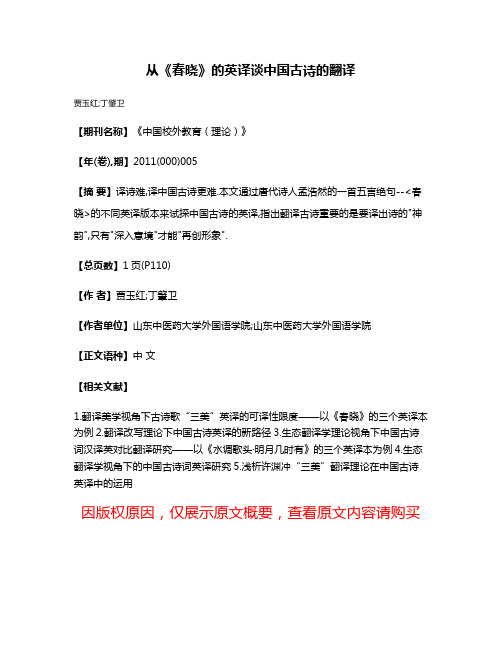
从《春晓》的英译谈中国古诗的翻译
贾玉红;丁肇卫
【期刊名称】《中国校外教育(理论)》
【年(卷),期】2011(000)005
【摘要】译诗难,译中国古诗更难.本文通过唐代诗人孟浩然的一首五言绝句--<春晓>的不同英译版本来试探中国古诗的英译,指出翻译古诗重要的是要译出诗的"神韵",只有"深入意境"才能"再创形象".
【总页数】1页(P110)
【作者】贾玉红;丁肇卫
【作者单位】山东中医药大学外国语学院;山东中医药大学外国语学院
【正文语种】中文
【相关文献】
1.翻译美学视角下古诗歌“三美”英译的可译性限度——以《春晓》的三个英译本为例
2.翻译改写理论下中国古诗英译的新路径
3.生态翻译学理论视角下中国古诗词汉译英对比翻译研究——以《水调歌头·明月几时有》的三个英译本为例
4.生态翻译学视角下的中国古诗词英译研究
5.浅析许渊冲“三美”翻译理论在中国古诗英译中的运用
因版权原因,仅展示原文概要,查看原文内容请购买。
- 1、下载文档前请自行甄别文档内容的完整性,平台不提供额外的编辑、内容补充、找答案等附加服务。
- 2、"仅部分预览"的文档,不可在线预览部分如存在完整性等问题,可反馈申请退款(可完整预览的文档不适用该条件!)。
- 3、如文档侵犯您的权益,请联系客服反馈,我们会尽快为您处理(人工客服工作时间:9:00-18:30)。
从《春晓》的英译谈中国古诗的翻译
译诗难,译中国古诗更难。
本文通过唐代诗人孟浩然的一首五言绝句——《春晓》的不同英译版本来试探中国古诗的英译,指出翻译古诗重要的是要译出诗的“神韵”,只有“深入意境”才能“再创形象”。
古诗英译《春晓》复合式解读直感式解读
译诗难,译中国古诗更难。
这可以说是译界人士的共识。
诗歌作为人类社会文学作品发展中的精华一直在文学的殿堂里闪耀光芒。
英国著名诗人Robert Browning曾做过类似这样的解释:诗歌是创作那一刻的灵感。
诗人有那么一刻创作的冲动,创作出来以后或许连他自己都不知该如何为诗释义。
诗的难解性可见一斑。
释诗就已如此之难,那么译诗更是可想而知了。
古今中外很多大文豪,大译家就提出“诗不可译”。
美国诗人Robert Frost的一句Poetry is what gets lost in translation.成为“诗歌不可译”者们的有力依据。
即使是主张诗可译的人士也提出要“以诗译诗”,“诗人译诗”。
我国的著名诗人郭沫若,闻一多等都是持这种观点的。
中国人的感性思维方式所创造出来的文化产品与西方人的理性思维所创造出来的文化产品是迥然不同的。
而唐诗最能体现这一点。
唐诗,是中国古代文学发展到鼎盛时期而产生的一个奇迹。
在形式上,唐诗讲求韵律格致;在内容上,则讲求一个“意”字。
古人所主张的“含不尽之意于言外”,“言有尽而意无穷”就是最好的说明。
所谓“言有尽而意无穷”指的是诗人的诗意不只在言内,更在言外。
也就是中国人所谓的“神韵”、“意境”。
要想将言外的“神”、“境”准确地表达出来是很困难的,更何况要以诗的形式用重形的西文来表达呢?所以才有了大家的共同体会:译诗难,译中国古诗更难。
虽然中国古诗难译,但随着世界联系的日益密切,为了让世界了解中国的文化精髓,中国古诗还是要译的。
但如何译?这是摆在每位译者面前的问题。
本文拟就《春晓》的英译来试探中国古诗的英译。
《春晓》是唐代诗人孟浩然的一首五言绝句。
此诗简洁晓畅,读来朗朗上口。
从字面看也易懂,但其内涵却是要好好体悟一番的。
清王尧衢在为其注解中指出:此诗字字做“晓”字。
第一句自不必说;第二句中,因鸟啼而示“晓”;第三句中,“夜来”示“晓”;第四句,一个“?”示“晓”。
这一切若非细细品味是很难领会得到的。
但这还不够,更深的内涵还深藏其中,需要慢慢领会。
这点下文会再提到。
让我们先看《春晓》的截然不同的两种译文。
春晓
孟浩然
春眠不觉晓,处处闻啼鸟。
夜来风雨声,花落知多少。
This morn of spring in bed I’m lying,
Not woke up till I hear birds crying.
After one night of wind and showers,
How many are the fallen flowers!
——许渊冲译
Late! This spring morning as I awake I know.
All around me the birds are crying, crying.
The storm last night, I sensed its fury. How many,
I wonder, are fallen, poor dear flowers!
——翁显良译
对照原文,我们可以看出,许译从形式上讲更接近原文,其对仗工整,简洁明快,与原诗十分相称,可以说是比较忠实地传达了原文的音,形,义。
而翁译在这方面却显得稍逊一筹。
我们甚至可以说翁译极不“忠实”地对原诗作了处理。
但我们不能不看到在传递原诗意象方面,翁译无疑占有绝对优势。
翁译从更深层次上表达了诗人在春天雨夜睡得香甜的美妙情景,及伤感“春雨打击花落下”的痛楚意境,从形、神两方面表达了诗人惜春、爱春、伤春的情怀。
同一首简单明了的古诗为何在两位大译家手里却成了截然不同的东西?这是与诗的解读有很大关系的。
张保红在其《古诗英译三题》中对此进行了详细的分析。
他指出这首诗虽语言平易浅近,自然天成,然而言浅意浓。
要读懂这首诗,仅从字面上理解是难以奏效的,从而提出了两种解读方式:复合式与直感式。
这两种不同的解读方式导致两种不同的解读效果,他指出:复合式,即诗人抓住清晨睡起刹那间的感情片段进行描写,但并不铺展开去,他只是向读者透漏他的心迹,把读者引向他的感情轨迹,然后让读者沿着诗人的思维方向去丰富和补充。
这种解读得出的诗的主题是惜春,爱春;直感式,即诗人亲历“春眠不觉晓”,亲闻处处鸟啼,亲受夜来风雨,亲见花儿纷落,这种解读得出的诗的主题是惜春,伤春。
回过头去再看译文,我们可以看出:许译采用了复合式的解读方式,他将诗人的直感和意识复合在一起对其进行理解,从而才有了他的译文;而翁译则采用了直感式的解读方式,从而他挖到了诗人的内在感受,也即挖出了原诗的深层意蕴,从而对原诗重新组合,通过对其意蕴的再表达再现了原诗。
两相对照。
我们
可以感到第二种解读方式似乎更能突出诗人直感感觉的敏锐,也更使该诗具有诗意特征。
而通过这种解读得出的译文也就更像是诗。
所以有人认为理解原文总比译成另一国文字要容易些的看法对于汉语却不尽然。
对于重意的汉语,尤其是其被应用到极限的表现——中国古诗,也许最关键,最难做到的还是在于理解,其次才是翻译。
虽然现今译界对不忠于原文的译文进行大肆批判,译界怪才林纾就是一例。
但在具体问题上我们也要灵活对待才行。
虽然我们不提倡林纾过分的乱译、改译,但其对原作“神”的把握却是我们该学取的。
在译诗方面更是要如此。
前文提到中国人注重的是“神韵”,是“意境”,而中国人的感性思维方式却使其能在一些意象面前感悟到其所包含的“神韵”。
但注重理性的西方人呢?他们能够领悟的到吗?如果他们不能领悟,那么我们的译诗还有什么意义,毕竟汉诗英译的目标读者是西方人,其目的是为了要向世界介绍中国的文化宝库。
基于此,笔者认为在古诗英译方面,我们要“深入意境,再创形象”。
深入意境,再创形象。
唯有此,才能创造出适合目标读者口味、鉴赏力的诗作。
不懂华文的庞德虽对中国古诗改容易貌,但他的诗作却体现了原诗的精神,更重要的是能让西方读者所喜爱,使他们得以了解中国文化的精髓。
这不正是我们的希望所在吗?当然要真的做到深入意境,再创形象并不是一句话的事。
笔者比较了《春晓》的9种译文,发现真正做到这一点的怕是只有翁教授一人。
这就需要有志于古诗英译的译者们提高自己的文化素养,尤其是对中国古诗的鉴赏能力。
只有挖出其深层的东西,才能对其进行完美地再现。
朱纯深教授在其《心的放歌》一文中指出:“诗,不是通过对其所指意义的解释而获得,而是阅读过程中因为用心的体验而产生,因为放心的翻译而驻留。
这就是‘诗意’”。
也许这应是每位译诗者所应记取的吧。
参考文献:
[1]朱纯深.心的放歌(二之一)——假设诗歌翻译不难[J].中国翻译,2002,(2).
[2]张保红.古诗英译三题[A].杜承南,文军主编.中国当代翻译百论[C].重庆:重庆大学出版社,1994.
[3]邵汉明.中国文化精神[M].北京:商务印书馆,2000
[4]王尧衢注.单小青,詹福瑞点校.唐诗合解笺注[M].保定:河北大学出版社,2000.。
